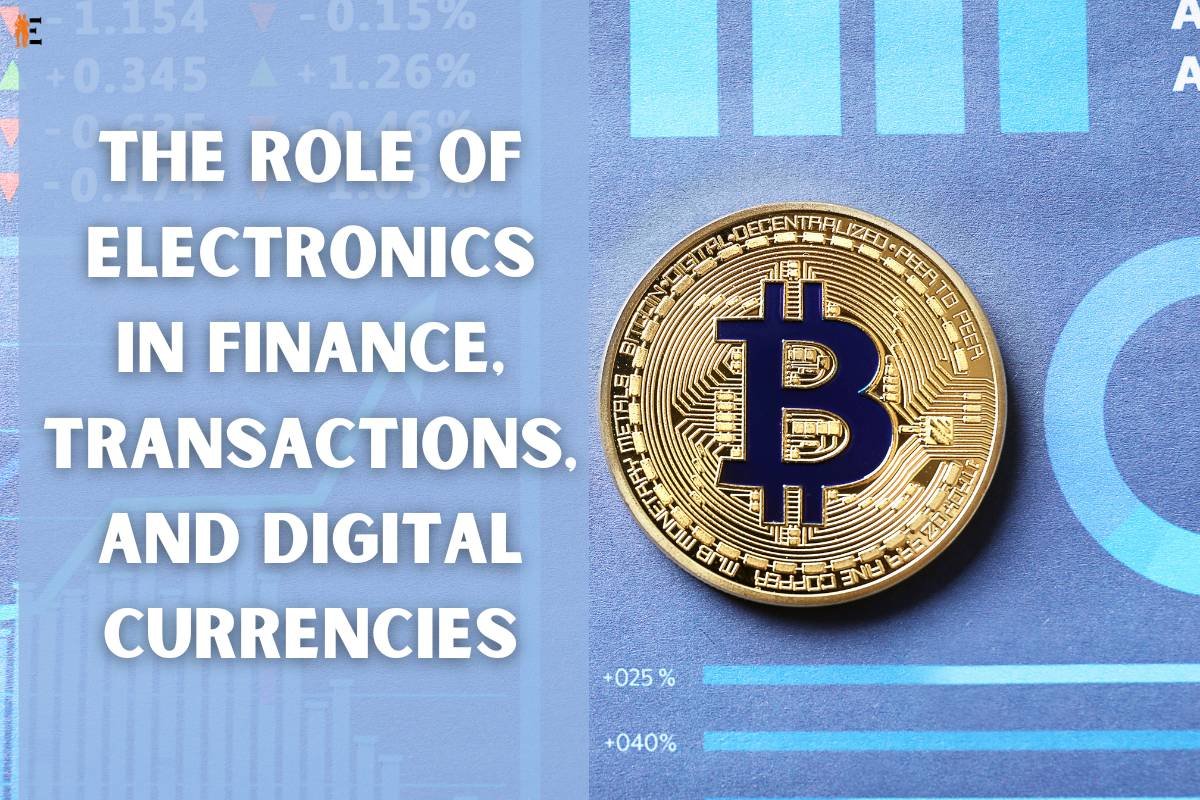Electronics in Finance, for transactions and digital currencies, are nothing new. These days, the demand for the use of these have been increased. People have started to adapt to these because it is easy to operate and it is time-saving. Digital currencies allow people to make direct payments without the involvement of cash transactions. The transfer that happens is safe and secure as technology is up to that mark already. Efficiency, accessibility, and innovation are the aspects that have taken fiancé, transactions, and digital currencies to the next level. The traditional banking processes have taken a step back since the invasion of modern banking and transactions.
The Role of Electronics in Finance
Electronics have transformed the way financial institutions operate, from retail banks to investment firms. The advent of electronic banking, also known as e-banking, has enabled customers to access their accounts, conduct transactions, and manage finances online. This digital shift has streamlined traditional banking processes, reducing the need for physical visits to branches and facilitating faster, more convenient services. The role of electronics in finance extends beyond customer interactions—electronic trading platforms have revolutionized stock exchanges and investment management, enabling real-time trading and global market access.
1. Revolutionizing Transactions Through Electronics

Transactions are the lifeblood of the economy, and the role of electronics has played in making transactions more efficient, secure, and borderless. Electronic payment systems, such as credit and debit cards, have become ubiquitous, replacing traditional paper-based methods. These systems facilitate cashless transactions, enabling consumers to make purchases conveniently and businesses to accept payments seamlessly. Moreover, the rise of mobile payment apps has further transformed the landscape, allowing individuals to transfer money, split bills, and make payments through their smartphones, fostering financial inclusion and reducing reliance on physical currency.
2. The Rise of Digital Currencies
At the forefront of the electronic revolution in finance is the rise of digital currencies, with cryptocurrencies like Bitcoin leading the charge. Digital currencies are decentralized, digital assets that operate on blockchain technology, a secure and transparent distributed ledger. The role of electronics in digital currencies is transformative—it eliminates the need for intermediaries, such as banks, in financial transactions. Digital currencies enable instant cross-border transfers, lower transaction fees, and offer an alternative store of value. This disruptive innovation challenges traditional financial systems, leading to discussions about the potential of a decentralized financial future.
3. Transforming the Finance Sector: A Technological Surge
The finance sector has undergone a seismic transformation driven by the surge in technological advancement. Financial institutions have embraced electronic innovations to optimize their operations, enhance customer experiences, and adapt to changing consumer behaviors. The role of electronics has not only streamlined processes but has also opened doors to new business models and revenue streams. Fintech startups, for example, leverage electronics to provide innovative financial services, including peer-to-peer lending, robo-advisors, and digital wallets. These startups are reshaping the competitive landscape and forcing traditional financial players to embrace technology to remain relevant.
4. Enhancing Financial Inclusion
The role of electronics in finance extends beyond the convenience of established economies—it has the power to enhance financial inclusion on a global scale. In regions with limited access to traditional banking services, electronics have enabled people to access financial products and services through mobile phones. Mobile money platforms, prevalent in developing countries, have democratized financial access, enabling individuals to save, transfer money, and access credit without relying on brick-and-mortar institutions. The electronic infrastructure is bridging the gap between the banked and the unbanked, fostering economic growth and empowerment.
5. Challenges and Opportunities

While the role of electronics in finance has brought about transformative benefits, it also poses challenges that need to be addressed. The increased reliance on electronic systems exposes the finance sector to cyber threats and data breaches. The rise of digital currencies has sparked debates around regulatory frameworks, consumer protection, and the potential for misuse in illicit activities. Balancing innovation with security and regulation remains a critical consideration.
Embracing the Future: A Call to Action
The role of electronics in finance, transactions, and digital currencies points toward a future where financial processes are faster, more efficient, and inclusive. Embracing these technologies is not just a choice; it’s a necessity for staying competitive in a rapidly changing landscape. Financial institutions need to invest in robust cybersecurity measures to safeguard electronic transactions and data. Regulations need to strike a balance between fostering innovation and ensuring consumer protection. Additionally, individuals need to adapt to electronic payment systems and understand the potential of digital currencies as alternative investment opportunities.
The Synergy Unleashed
The synergy between finance, transactions, and digital currencies has paved the way for transformative developments:
- Efficiency: Electronic transactions and digital currencies offer speed and efficiency, reducing the time and cost associated with traditional financial processes. Cross-border transactions are settled quickly without the need for intermediaries.
- Financial Inclusion: The digitalization of financial services has democratized access to banking. Digital wallets and mobile payment apps provide individuals, including the unbanked, with avenues to save, transfer money, and access credit.
- Innovation: The interrelationship has spurred innovation in the financial sector. Fintech startups leverage electroallownics to develop novel solutions, such as robo-advisors, crowdfunding platforms, and blockchain-based applications.
- Decentralization: Digital currencies challenge the centralized control of traditional financial institutions. The decentralized nature of cryptocurrencies empowers individuals with greater control over their financial transactions and assets.
- Navigating the Electronic Frontier: In an era where the interrelationship of finance, transactions, and digital currencies is driving change, adaptability is key. As individuals, businesses, and governments traverse this electronic frontier, there are several considerations to keep in mind:
- Education: Understanding the basics of digital currencies and electronic transactions is essential. Education empowers individuals to make informed decisions and navigate the evolving financial landscape.
- Security Measures: Implementing robust cybersecurity measures is crucial to protect personal and financial information from cyber threats and data breaches.
- Regulatory Awareness: Staying informed about evolving regulations surrounding digital currencies and electronic transactions ensures compliance and minimizes legal risks.

Conclusion:
The role of electronics in finance, transactions, and digital currencies has redefined the financial landscape, making it more accessible, efficient, and adaptable. The digital transformation has not only streamlined traditional processes but has also given rise to innovative financial services and alternative modes of exchange. As the finance sector continues to evolve, embracing the potential of electronics is not just about adopting technology—it’s about shaping a more inclusive, secure, and dynamic financial future. From electronic banking to the rise of digital currencies, the world of finance is being reshaped, and those who recognize and harness the role of electronics are poised to thrive in this era of unprecedented change.











